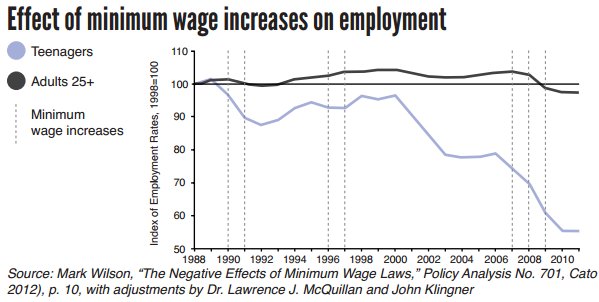Kevin Graham wrote:Yes, I'm sure you're, oh so concerned about unemployment among black Americans!
Of course I am. Why wouldn't I be? But honestly, I'm more concerned with the unemployment of teenagers since I have teenagers, which is also seriously influenced by minimum wage laws.
But if I didn't care about unemployment among entry level/ unskilled workers, then I honestly wouldn't care about the minimum wage laws. I don't pay anyone minimum wage and I don't earn minimum wage, so other than its effects on overall wage and price inflation, it doesn't really concern me.
But the fact is you're argument is pretty much the same argument the Confederate South used to defend the practice of slavery. After all, by ending slavery we put hundreds of thousands of black folks out of work, right?! But the fact is increasing the minimum wage has never been shown to increase unemployment.
It's called a "
Price Floor", and if you can show that raising the price floor for labor doesn't effect demand, you would most certainly get a Nobel Prize in economics.
Of course, this only applies to the "unskilled" labor market. For jobs above minimum wage, it won't change much of anything. That's why you won't see a huge change in overall unemployment figures. But what do you see if you look at unemployment for unskilled/entry-level workers?
Hint: everyone knows this, which is why the minimum wage can only be adjusted to influence the poorest of workers. If the price floor were adjusted too high (say, to $20/hr, or $40/hr), then it would wreak havoc on the regular employment market, and suddenly it would influence the larger unemployment figure as employers scrambled to find cheaper alternatives for labor, be it outsourcing or robots or something else.

If you want to argue that the societal benefit of raising minimum wage a small amount (say, $.50) is worth the cost to society, that's fine. But to argue that there is
no cost is absurd.
The fact is Social Security has dramatically reduced poverty among the elderly in this country since its inception. That is an established fact that no amount of rhetoric is going to overthrow. All you're left with now is the obligation to come up with some way to explain why saving the lives of millions of Americans and/or improving their quality of life, is something not worth the payroll taxes we pay into.
Obviously taking money from workers and giving it to retirees makes the retirees richer. How could it not? The problem is that the system is unsustainable. If our only concern is making old people rich, then we could make social security payments much higher, say, $10k/month. Why not? Then the program would be even
more successful. And the government could just print money to cover any shortfall.
Yes, because government isn't interested in quarterly statements and ever increasing profits (via increasing costs). By contrast, private corporations are only interested in this. That's why it is in their best interest for us all to be as sick as possible, and to pay as much as they can make us pay for basic health care.
If only we had companies that provided health care and insurance that weren't focused on making a profit. We could even call them "un-profit" companies, or "zero-profit" companies, or maybe "
non-profit" companies?
That's a great idea, and you should think about promoting it. You might even get another Nobel Prize for inventing the idea of a private company that isn't focused on profits. That's
two prizes in one thread!
But calling it a government monopoly is just dumb. This isn't what Obama has proposed - he proposes a single payer system while keeping the current private medical professionals providing the services - but I would be all for universal health care. After all, it works in other countries who don't have to worry about skyrocketing health care costs.
It's an age-old axiom that any service has three components:
The Price of the service.
The Quality of the service.
The Speed of the service.
What countries are you thinking of that have a lower cost for health services while maintaining the quality and speed (i.e. length of time to schedule appointments and procedures) of the US system?
